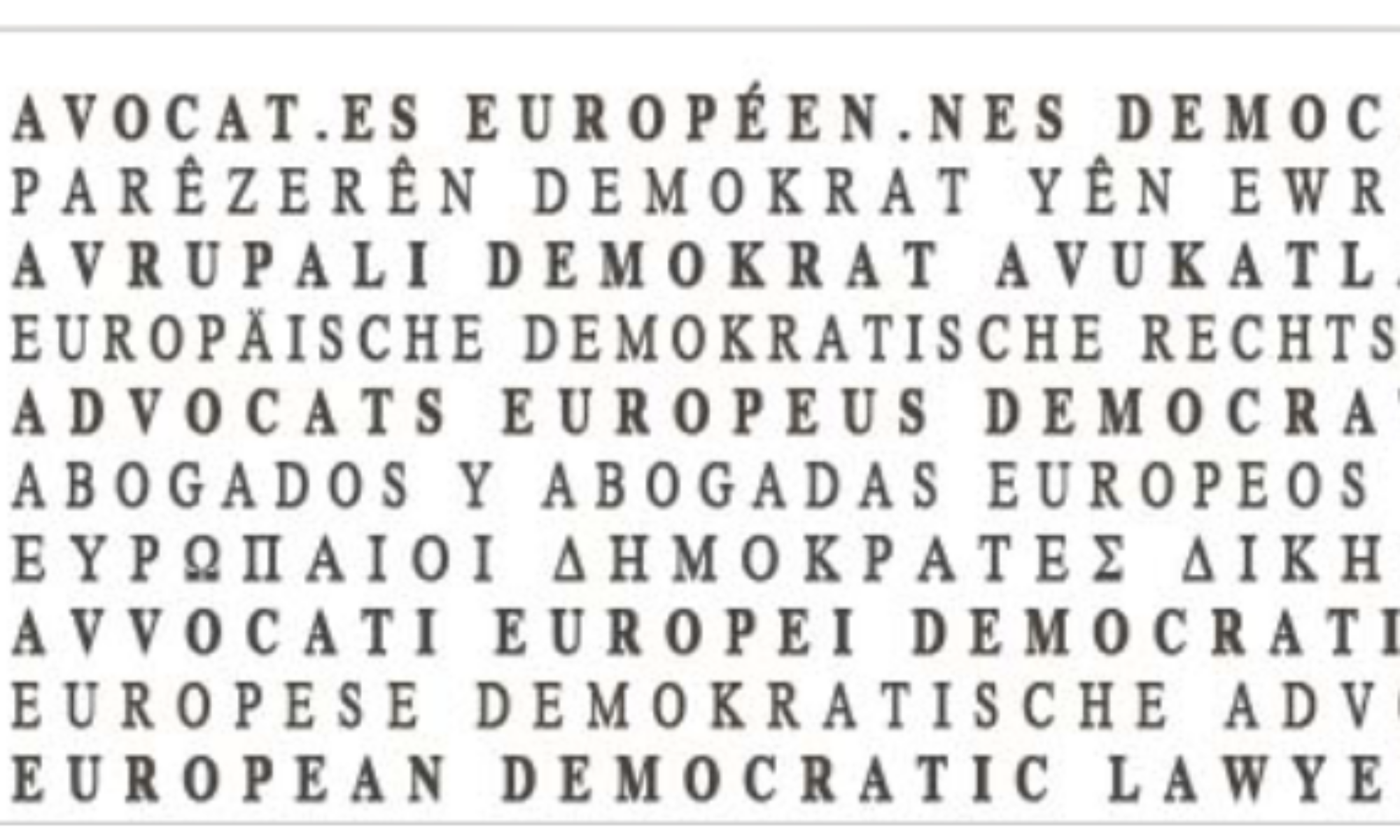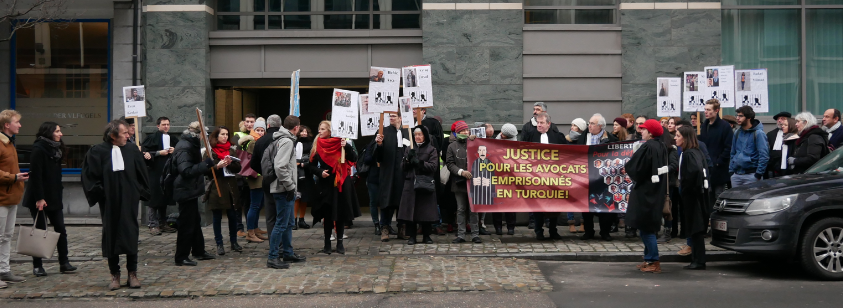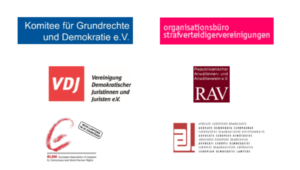After years of persecution and resistance, the CHD has decided to renew
the association.
ÇAĞDAŞ HUKUKÇULAR DERNEĞİ ORDINARY GENERAL ASSEMBLY
CONCLUDING STATEMENT
“WE ARE HERE SINCE 1974”
Our Association was closed down by the government in 2016. We had then announced that this was not a legitimate decision for us; we would not accept it. When our offices were looted, and the doors of our offices were locked up and sealed, “ÇHD does not exist merely in the offices”, we said. As we account for the hard process we have gone through we have the honor to keep to our word.
We are honored, that is correct. However, we are not surprised with the seamless will to struggle of our Association as well as its attitude in the face of the contemporary of state of affairs in our country. For this outcome comes naturally out of the power and legitimacy of our tradition. It is equally the immediate result of our faith in and aspiration for a just, free, classless world that does not welcome exploitation. In this process, some of our valued Bu members were held captive; they were tortured; they were convicted to ten year-long imprisonment. But we have persisted to convey to our friends and foes, to Turkey and to the whole world that another lawyering practice is possible and that ÇHD will never and ever withdraw from opting for this practice.
The Conference that we organized within the scope of the Ordinary General Assembly, on January 18, 2020 was turned into a vibrant platform for struggle where our decisiveness, our will to solidarity and resistance came to the fore, showing the impossibility to end the ÇHD by despotic measures.
The Ordinary General Assembly also showed that the ÇHD is not alone in its struggle; that it has hundreds of comrades who would join the struggle for a just world. The messages of friendship and solidarity, sent by many lawyers’ organizations to our Association are examples of this. The messages that we received from the workers in the tents of struggle, from the families of Soma miners, from the families of Çorlu train massacre, from the families of our friends who were taken from us in the October 10 Train Station massacre and in Gezi resistance once more confirmed the historical importance of the lawyering practice of the ÇHD. The messages of friendship, comradeship and solidary that we received from our colleagues in Italy, Portuguese, United States, Phillippines, Netherlands, Germany, Switzerland, Asia-Pacific countries, Catalonia, Greece who struggle with similar faith and decisiveness also showed the extent of our reach throughout the world, that we are part of a global comradeship. In this respect, the first conclusion that we have is as follows: We claim each and every concern of social opposition in the world, in general, and in Turkey, in particular! We claim the concern of each and every resistance tent, strike, boycott, the demands of a body, vanishing for justice, the demands of women, resisting on the streets, the demands of our colleagues in France, throwing their robes, the claims of the lawyers in Pakistan – our comrades who were killed – all our claims, too! They claim ours! The hope for free, just and bright features lies in such true solidarity.
“The Crisis of Capitalism, the Crisis Law”
The Ordinary Constitutive Assembly that we held under the title, “Crrisis of Capitalism, the Crisis Law” opened a space where we could underline the social dynamics of the present historical period and discuss the agendas of social opposition – to which the ÇHD has been a historical party – and the requisites brought in by these agendas. Many members of our Association have contributed significantly to these discussions with their presentations.
Assessing the presentations and discussions together we reached the following conclusions:
- We are at a critical historical phase not only in Turkey but throughout the world. On the one hand, we observe the aggressive imperialist policies that increase with the deepening economic crisis. On the other hand, we witness the rise of resistance in different parts of the world. These developments point at the main lines of struggle and possible alliances in the coming years.
- ÇHD, is the name for a certain practice of lawyering. In the process ahead of us, it should be the main mission of all its members to carry this practice of lawyering, developed by the ÇHD laboriously into the new period. ÇHD is the organization of the lawyers who are the workers of struggle, turning the law into a means for justice – and not those lawyers who approach the law as a technical asset. With such awareness we cite the following topics to be included in the agenda of the ÇHD:
- ÇHD started its Ordinary General Assembly in the absence of our dear Chair, Selçuk Kozağaçlı, and our respectable members Behiç Aşçı, Aytaç Ünsal, Aycan Çiçek, Ebru Timtik, Barkın Timtik, Oya Aslan, Ayşegül Çağatay and Engin Gökoğlu since they were imprisoned. The first item of the ÇHD in the past, present and future shall be the freedom of their colleagues who were taken prisoner, who were taken hostage. It is certain that ÇHD should organize effective actions for the freedom of our colleagues who are imprisoned. It is also important that the ÇHD should also adopt an effective working style in matters listed below for the strengthening of social opposition – which is also significant for the freedom of our imprisoned colleagues. We shall not step back from the maxim, “Freedom to Imprisoned Lawyers”, until our last imprisoned comrade gains her/his freedom.
- ÇHD shall continue to take sides with the workers and labor in the face of all attacks against the working class. It is clear that it should be the capitalists to pay for the crisis, not the workers. ÇHD believes in the legitimacy of the working class struggle; we shall not reduce the working class struggle to the laws and the courtrooms. We shall be in solidarity with the working class on this basis; we shall struggle in solidarity with the working class. We shall continue to be in solidarity with the working class whenever and wherever they are attacked, whenever and wherever they are hurt, whenever and wherever they stand up.
- The suicides that span through the country is a concern for the ÇHD. ÇHD does not approach the suicides as individual cases; it knows that anti-capitalist struggle is the only bulwark against the increase in the number of suicides due to the crisis of capitalism.
- The process of the State of Emergency (Olağanüstü Hal, OHAL) was used as a grounds to dissolve the public space and to continue with the neoliberal transformation. ÇHD acknowledges that its our duty to keep up with solidarity with the public workers who were dismissed from public service and who were almost pushed to die civil death.
- The power bloc in Turkey is accelarating its attacks and violent practices against the Kurdish people. ÇHD, as its also stated in our by-laws shall defend the right of nations to self-determination. Pursuant to this principle we shall put solidarity with Kurdish people in every sphere and at every level among our prior duties in the coming period. ÇHD defines the imprisonment of the political representatives of Kurdish people and the appointment of trustees to the elected municipal administrations as part of colonial politics and a matter of political injustice. Our Association shall continue its stance against the war against the Kurdish people that involve occupation and annihilation in our country as well as across the borders. ÇHD shall stand against all kinds of aggressiveness by Turkey, of all reactionary-fascist countries in the region and cross-border imperialist forces against the will of the Kurdish people.
- It is obvious that the region is under attack of the aggressive imperialist policies that are aimed to reshape it; to open up space for wars that would bring in evermore blood, hunger, poverty to the peoples in the region. It shall be one of the main duties of the ÇHD to adopt the maxim, mperyalist talan ve saldırganlık politikaları karşısında “war against the palaces, peace to the cottages” to be an active party to the anti-imperialist struggle that would enhance solidarity with the peoples in the region.
- The environmental plunder, the right to the environment, and climate rights are the topics that concern us. ÇHD takes sides with all struggles against Channel İstanbul, hydroelectric power plants and similar practices that are environmentally destructrive.
- Today in Turkey, the average number of women who are killed in domestic violence daily is five. The OHAL process brought in a period when violence against women and the LGBTIQ+ was increased and reinforced by the conservative rhetoric that has been circulated by the government. In the meantime, the courts have been functioning as mechanisms of impunity in cases of violence and rape. One of the topics in the ÇHD’s agenda for struggle in the new period is to eliminate the current impunity in the juridication concerning cases of gender-based violence.
- Gender equality is one of the main topics of concern for ÇHD. This was true yesterday, and it still is true today. We shall develop the means for ensuring gender equality in every social sphere and to struggle against sexism.
- Prisons shall be one of the main concerns for ÇHD’s struggle. This was the case in past; it shall be the case today. Today it is obvious that illegality is the norm; thus the prisons are filled with political prisoners. In our country, political prisoners are involved in actions, extending from hunger strikes to death fasts in order to defend and/or claim their most basic rights. ÇHD shall continue to work to defend the rights of the political prisoners and stand by them. All political prisoners who are imprisoned due to their claim to a classless, free and just world where exploitation is eliminated are ÇHD’s clients, friends and comrades.
- ÇHD shall also follow the attacks against the profession. Lawyers are impoverished increasingly, lawyers-as-workers try hard to make ends meet, they are exploited. We shall not forget our colleague Gökhan Vural Arı who committed suicide. We shall keep struggling for our colleagues’ economic and social rights as one of the main topics of concern of the ÇHD.
- The licences of legal apprentices are usurped. This usurpation is realized in an arbitrary fashion and a group of legal apprentices are tried to be prevented by the power-holders at the very initial stages of their career, since they are perceived to be “threats”. This attack grows out of a futile fear, but it has serious consequences. Eliminating against this attack shall be one of the main topics in ÇHD’s new period.
- Enhancing the solidarity with the migrants and refugees shall clearly be a main topic of concern for ÇHD. Millions of migrants who have been turned into objects of bargaining by Turkey and the power-holders in Europe are also victims of racism that has been deliberately provoked by the same power-holders. ÇHD shall approach the rights and liberties of the migrants and refugees on an equal stand with the rights and liberties of citizens’ rights and liberties.
- There is no jurisdiction in Turkey. Criminal jurisdicion is conducted directly by command; thousands are deprived of the right to just jurisdiction; their right to defence are restricted; they are imprisoned. In this period when coursehouses fall short of ensuring justice, it is the ÇHD’s duty to take sides with the rights struggles of the oppressed, repressed and whose rights are violated.
- ÇHD is aware of the significance of the international solidarity of progressive lawyers. In this respect, it shall further develop the activities that it has already been pursuing. In this respect, we shall support our colleagues who are in resistance in France. In the meantime, we shall look for ways and methods to stand by the Pakistani democratic lawyers, to whom the Day of the Endangered Lawyers is dedicated in 2020. One step in this regard shall be active participation in the international action that will take place on January 24, 2020.
In the light of these statements and decisions, our General Assembly considers the letter sent by Selçuk Kozağaçlı as a statement and announces the following decisions:
From now on, ÇHD shall continue with its solidarity acts in the past, and “shall take its place in strike tents, in front of the morgues, in the faculty boycotts, behind the barricades, in front of the queues. ÇHD shall concern not to be more intelligent than the ones with whom we struggle together but to turn the potential to fight together, to trust to each other into action in order to weave an axis of struggle.”
ÇHD Ordinary General Assembly is determined to show that, “to be nuts is preferable than to be obedient”! For it us who claims the reputation to be the nuts, to pursue the impossible and not to hesitate to tresspass; we shall not turn it over to anyone!
ÇHD IS HERE; IT WILL ALWAYS BE HERE!




 Moreover, the broad majority of cases remain unreported. The estimated number of unreported cases is as high as five times the reported cases.
Moreover, the broad majority of cases remain unreported. The estimated number of unreported cases is as high as five times the reported cases. En outre, la grande majorité des cas ne sont toujours pas signalés. Le nombre estimé de cas non signalés est jusqu’à cinq fois plus élevé que le nombre de cas signalés.
En outre, la grande majorité des cas ne sont toujours pas signalés. Le nombre estimé de cas non signalés est jusqu’à cinq fois plus élevé que le nombre de cas signalés.



